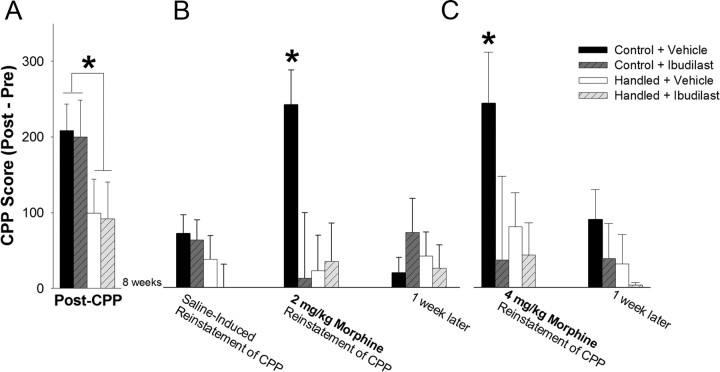Figure 8.
Ibudilast does not affect initial morphine CPP but mimics neonatal handling by significantly blocking drug-induced reinstatement of morphine CPP following either a priming dose (2 mg/kg) or a larger dose of morphine (4 mg/kg) in nonhandled control rats. Neonatally handled or nonhandled control rats were given ibudilast (7.5 mg/kg) or its vehicle 30 min before each morphine (4 mg/kg) conditioning session of CPP (n = 12/group). A, Neonatal handling significantly decreased morphine preference when compared to nonhandled control rats, and morphine CPP was unaffected by ibudilast treatment at the time of CPP (*p < 0.05; n = 12/group). B, Two months later, injection with saline (1 ml/kg) alone does not reinstate morphine-seeking behavior; however, treatment of rats with a priming dose of morphine (2 mg/kg) was sufficient to reinstate morphine-seeking behavior in nonhandled controls previously treated with vehicle (*p < 0.05 compared to all other groups). Neonatal handling significantly blocked reinstatement of morphine CPP, and this effect was mimicked in nonhandled control rats by blocking glial activation at the time of morphine CPP with ibudilast. C, Injection of the same rats with 4 mg/kg morphine was sufficient to reinstate morphine-seeking behavior in nonhandled control rats initially treated with vehicle, while blocking morphine-induced glial activation at the time of CPP and neonatal handling were each sufficient to block the drug-induced reinstatement of morphine-seeking behavior (*p < 0.05 compared to all other groups).

